Two things caught my eye recently.
- The recession in Greece is causing a boom in bike sales and cycle use.
- An advert for the Nissan leaf promising to do 385 miles to the gallon. This will enable you to run your car for £175 a year as opposed to £1,200 a year.
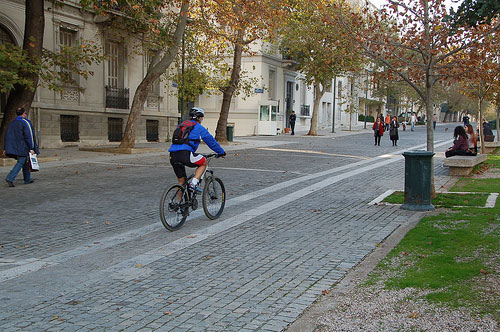
Athens cycling by Rob Wallace
Firstly, the experience of Greece is an economic and social catastrophe. It’s a shame that it has required a devastating recession to encourage cycle use. But, now that people can’t afford to buy petrol, they are turning to the alternative – the bike.
In Greece, the number of cars on the road declined by 40% in the past two years. By contrast, bicycle sales boomed by more than 25% to 200,000 units in 2011. The bike business is one of the few thriving sectors in the economy with cycle shops springing up in all parts of Athens.
Despite the difficulty of cycling in Athens (bad driving, no infrastructure, unsympathetic driving, little cycling culture), people are being forced onto their bikes out of economic necessity. “This is not Berlin. Here it’s risky but you need to start thinking what you’ll cut back on – taxis, the metro,” said Elena Koniaraki, 39
The reverse is also true, the reason cycle use has been in long-term decline during the twentieth century is that motoring became progressively more affordable. Why cycle, when you can afford a car?
Future Congestion in the UK
I have mixed feelings about the Nissan leaf. On the one hand it is very good for the environment. In an era of rising oil prices and dwindling reserves, it makes sense to promote this kind of car. I’d quite like one myself to save on fuel costs. The only surprise is that it’s taken so long to promote this kind of car. If the will was there, we could already have much improved fuel efficiency of all cars.
At £25,000, you may think that the Nissan Leaf is too expensive. But, I’m convinced that this is the future of motoring. Within a decade, I think it will be the norm for cars to do 400 miles to the gallon.
This will be good for environmental pollution levels, it will be good to reduce our dependency of oil reserves, but it will mean motoring costs will continue it’s long-term downward trend.

Source: Oil Drum
Motoring is a very powerful lobby, and despite all the complaints about the cost of motoring, in the post-war period the real cost of motoring has fallen dramatically. The current rise in petrol prices is a mere temporary aberration. Most people drive; motoring is a powerful political lobby. This is why the government axed the recent planned rise in fuel duty – it makes good political sense to make driving cheaper.
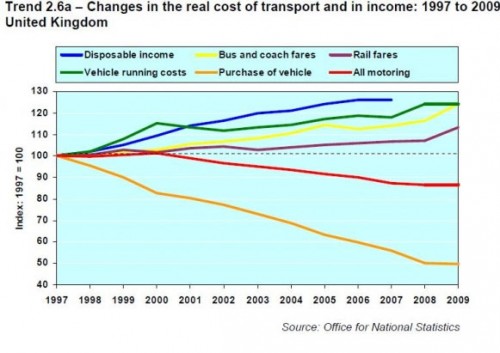
The recent recession caused a sharp rise in cycle use and a fall in spending on cars
Others include air, cycling, motorbikes. Source of stats, ONS Social Trends 40
Cost of Motoring
Since 1985, the cost of public transport has been increasing faster than overall motoring costs. I believe in the 1960s and 1970s, the real cost of motoring fell (unfortunately I can’t access stats I saw recently). Combined with an extensive road building programme, it was hardly surprising there was a growth in car use.
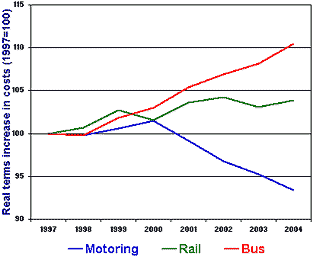
Source: FOE
Countries like the Netherlands show it is possible to transcend this economic link and encourage cycle use where it is cheap to drive, but it is rare and difficult. See: Cycle Rates by Country
The Importance of Economics
You can win 8 Olympic cycling gold medals, you can paint blue lines on the road, you can have the mayor of London riding a bike across a tightrope stretched between Big Ben and Parliament, but at the end of the day – the biggest motivating factor in determining transport is economics. If motoring is expensive, people will think twice before driving and you can encourage cycle use. But, if motoring is very cheap and a small % of income, it’s very hard to get people out of their cars.
Economics of Congestion
The most likely scenario is that the cost of motoring will continue it’s long-term post-war fall. Motoring will be so cheap, congestion on British roads will continue to rise in the long-term.
It is only when congestion gets so bad in cities like London, that cycling begins to have an economic benefit. It’s not just the actual cost, but the time involved. One problem of cheap motoring is that it creates congestion – which is the hidden cost of cheap petrol and high miles to the gallon.
Social Cost of Driving
I do drive, but I expect to pay significant taxes on driving. Cars have external costs. It makes economic sense to tax cars and subsidise other forms of transport. But, whether the political will is there I don’t know. See also: No such thing as free parking
Related
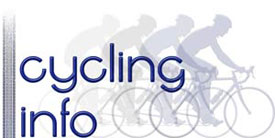

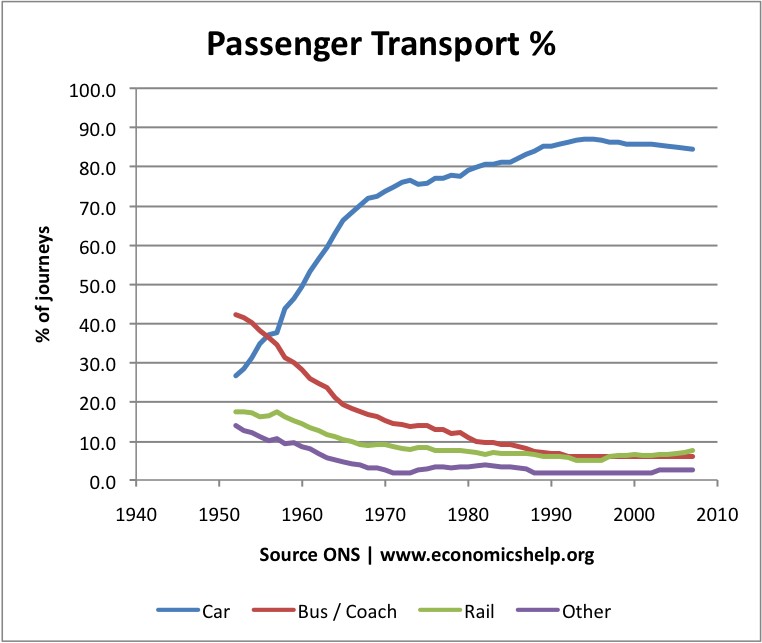
If people start cycling more because motoring becomes more expensive, does that run the risk of encouraging a perception of cars as an aspirational thing for the well-off and bikes and buses for the poor masses? Does it just enforce the idea of bikes being for kids and poor people and further damage the image of cycling?
It’s my understanding that currently, because of the relative low cost of motoring, a high percentage of cyclists are actually relatively well-off – economics lecturers and the like . They cycle because they choose to rather than because they have to.
. They cycle because they choose to rather than because they have to.
Surely much better if you can further encourage cycling via good infrastructure because it is socially better and more convenient for everyone, regardless of income, despite motoring remaining relatively cheap.
Of course, as you point out, eventually congestion eventually decreases the opportunity cost of driving, especially in cities. However, because of the infrastructure increased motoring also has various negative effects on cycling (and some public transport) – it too becomes less convenient and cycling is much more dangerous on congested roads. You don’t have to charge more for petrol, but if like the Dutch, you make cycling more convenient and pleasant, partly at the expense of the driver, then you can make towns nicer for everyone.
Of course, closing though-routes to drivers and slowing traffic down might not be popular with some people either.